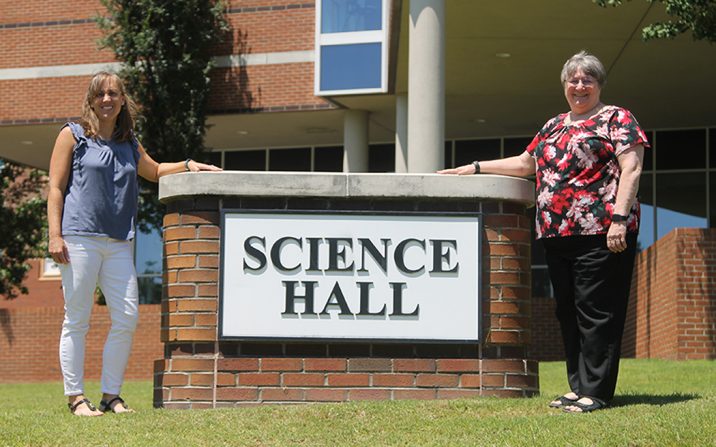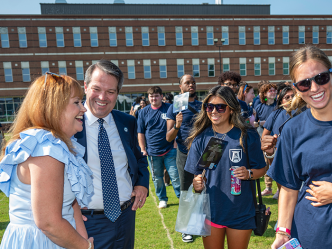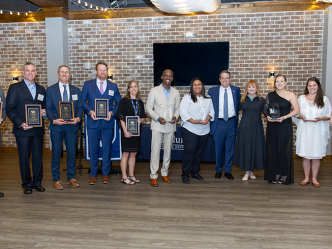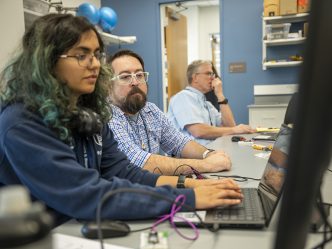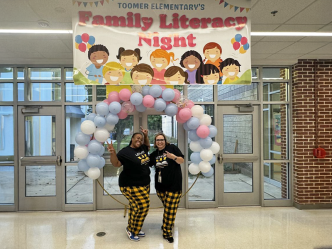The National Science Foundation (NSF) has awarded Augusta University $905,444 to increase the number of students completing undergraduate degrees in STEM disciplines.
Dr. Angie Spencer says almost 80% of it will be dedicated to student scholarships, with the rest going to educational support.
“One of the biggest challenges for our students is being able to go to school full-time and not have to work,” said Dr. Cathy Tugmon, associate dean of the College of Science and Mathematics. “If you’re a STEM major, given the difficulty of the subjects and all the lab work required, if you work even part-time, you are less likely to be successful. We felt strongly that the more we can provide in scholarships, the less likely students will have to work and the more likely they will complete their degree.”
Spencer, the principal investigator, said that over its five-year duration, the project entitled “Promoting Opportunities and Pathways for Undergraduate Persistence in Science, Engineering, Technology, and Mathematics,” will fund three-year scholarships for approximately 30 students who are pursuing bachelor’s degrees in biological sciences, chemistry, mathematics or physics.
The NSF is an independent federal agency created by Congress in 1950 “to promote the progress of science; to advance the national health, prosperity and welfare; to secure the national defense.”
Spencer noted NSF requires that for this type of grant, a minimum of 60% must be earmarked for scholarships. However, she said, “We increased the amount to almost 80% ($700,000) based on findings from a survey of STEM majors at Augusta University.”
Of the 300 students majoring in STEM disciplines who responded, 66% said they worked at least 10 hours a week and 32% said they worked 20 hours a week.
“One of the things we were trying to do is find students who are likely to be successful in whatever STEM field they’ve chosen, then support them monetarily and in other ways. The monetary support will reduce the need to work so they can invest more time in their studies,” Tugmon said. “The goal is to help students overcome some of the barriers to successful completion of their degrees and thus increase the number of STEM graduates.”
Tugmon said that because of the national need to increase the diversity of STEM graduates, close to 50% of the scholarships will target students underrepresented in STEM fields, including first-generation students, ethnic minorities and women.
“Across the U.S. there is a need to increase the diversity of STEM graduates,” she said.
Spencer and Tugmon said there is a deficit in the number of students who successfully complete STEM degrees because they either lose momentum and change their majors or do not successfully complete the course work.
“The bottom line is we want the students to be successful and we’re working really hard to provide them the support they need,” Spencer said. “That’s what this grant is about.”
Those involved in writing this grant have devised plans geared toward providing students with activities that will pique their interest, develop soft skills as well as classroom and lab skills that previous research has shown will increase their sense of belonging, success in their classes, and sense of self-efficacy.
In addition, this grant includes a mentoring program that Spencer said “we’re calling triangular mentoring. It has a peer mentor component, a faculty mentor, and a professional mentor from the local community during their senior year.”
Spencer and Tugmon stressed the importance of the community’s participation moving forward.
“We need community support; we’re going to need professional mentors from local industries, medical providers, government agencies, and private employers,” Tugmon said. “We are going to reach out to local employers for these mentors. With their help we believe we can provide more STEM graduates who are willing to stay in the community, thus building our area’s employment base. If community professionals mentor these students, it’s highly likely that they may choose that company, agency, or medical provider as their employer. So it’s a win-win on both sides.”
Spencer noted that as part of the grant, Dr. Ashley Gess, an assistant professor in the College of Education, is going to work with College of Science and Mathematics faculty through instructional rounding, which is a way of observing people teaching based on a specific question or a particular topic in the classroom. The need for instructional rounding, which is viewed as professional development for instructors, also emerged from the survey data as CSM faculty look for ways to improve student interaction in the classroom.
The project team consists of seven members: Spencer (Chemistry) leads the team; Gess will take the lead on the self-efficacy and instructional rounding pieces; Dr. Andy Hauger (Physics) and Dr. Sam Robinson (Mathematics) are crucial to the high-interest activities plan; Dr. Laurence Miller (Psychological Sciences) is championing the mentoring piece; Dr. Deborah Richardson (Psychological Sciences and an Associate Dean) is designing and leading assessment of the effectiveness of the work; and Tugmon (Biological Sciences) is responsible for student recruitment and awarding of scholarships.
Spencer noted that “everybody on the committee has a piece of themselves in this grant. It was that collaboration and cooperation that made it a successful proposal.”
Spencer said scholarships will be awarded to academically talented, financially eligible second-year students starting in the fall of 2020. The application process will open up in the spring of 2020.
 Augusta University
Augusta University
